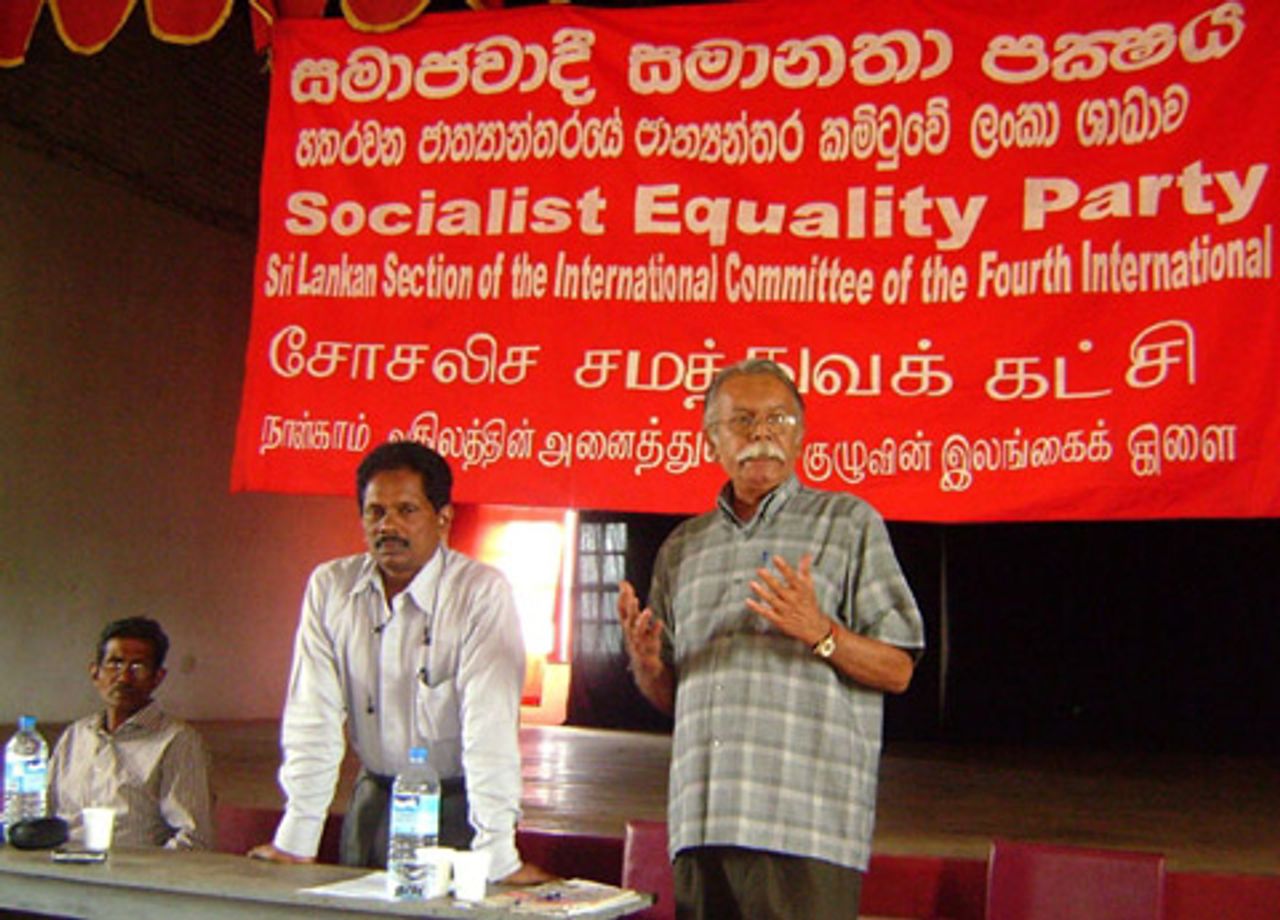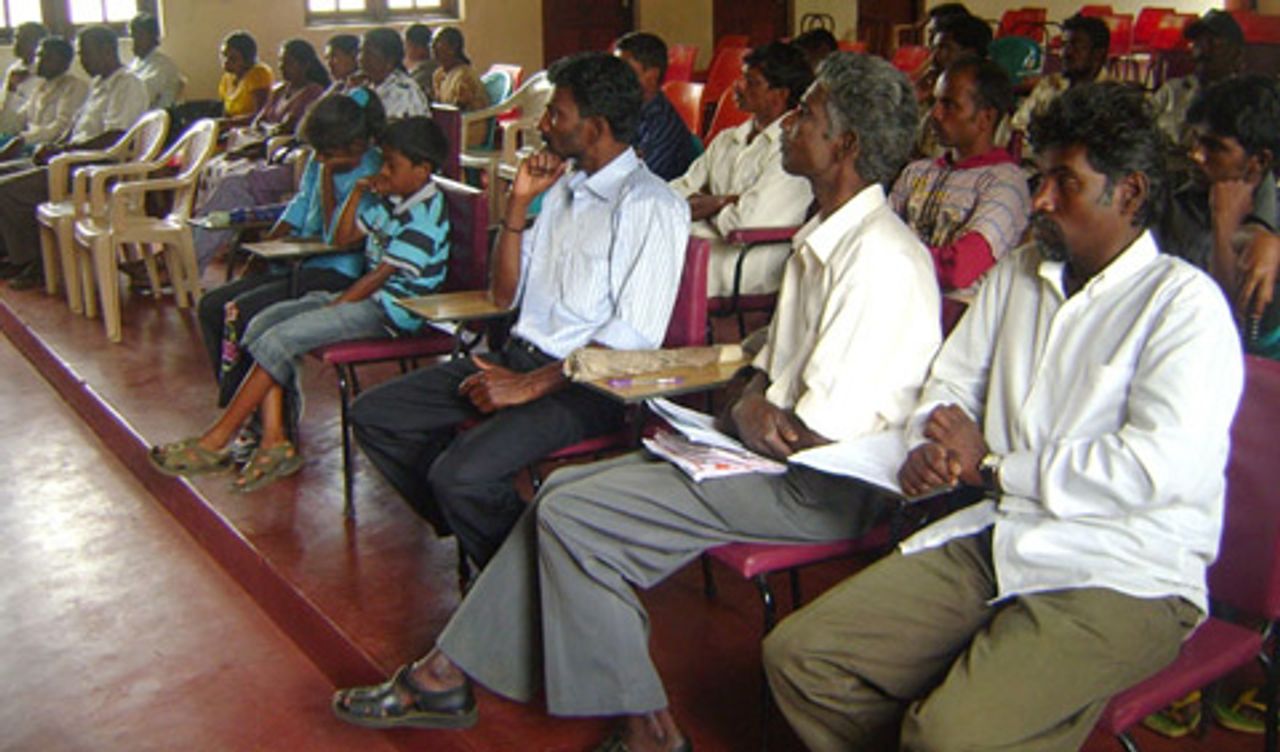The Socialist Equality Party (SEP) in Sri Lanka held an important public meeting last Sunday in the town of Hatton in the plantation district in the centre of the island. Attended by local workers, youth and housewives, the meeting was entitled “The World Economic Crisis and the Plantation Workers’ Struggle” and was organised in the midst of widespread outrage by estate workers over the recent wage sell-out imposed by the plantation trade unions.
Led by the Ceylon Workers Congress (CWC), the unions joined forces with employers and the government to impose a poverty-level wage settlement on plantation workers. While the Up-country Peoples Front (UPF) and the All Ceylon Plantation Workers Union (ACPWU) posture as opponents of the wage deal, these organisations are instrumental in containing and suppressing opposition to it.
SEP teams campaigned widely for the meeting among estate workers in Agarapathana, Thalawakelle, Kotagala, Watawala, Maskeliya and in Hatton itself, distributing thousands of copies of the SEP statement “A socialist program for Sri Lankan plantation workers” and other World Socialist Web Site articles.
Members of the Balmoral Estate Action Committee travelled two hours from Agarapathana to attend the meeting. The committee was recently established at Balmoral Estate with the political assistance of the SEP, indicating that an important section of the Sri Lankan working class has begun to break from the political straightjacket imposed by the unions.
Workers attentively listened to speeches at the meeting, explained their own experiences and exchanged views during the discussion, a reflection of deep-going political changes, not just among plantation workers but within the entire working class.
SEP member A. Shanthakumar, who chaired the meeting, said that the recent wage struggle demonstrated that workers could not defend their rights through the trade unions and that society had to be reorganised on the basis of a socialist program. This, he continued, was the only answer to government and employer attempts to impose the burden of the world capitalist crisis on working people.
“Plantation workers can’t fight alone,” he said, and explained that the SEP was “calling for the unity not only of plantation workers but other sectors of the working class and a turn to their class brothers and sisters in south Asia and internationally.”
 SEP general secretary Wije Dias with A. Shanthakumar (left) translating into Tamil
SEP general secretary Wije Dias with A. Shanthakumar (left) translating into TamilSEP Political Committee member M. Thevarajah began his speech by stating that the decision by Balmoral Estate workers to form an independent action committee had international significance. In the context of a major global economic downturn, he said, “workers everywhere face similar problems.”
Referring to the wage struggles of plantation workers in 2006 and in recent weeks, Thevarajah showed the audience a fax sent to the police that contained the names of 34 plantation workers who protested in Bogawanthalawa. It was strongly suspected, he said, that the fax was sent by CWC because these workers opposed the union’s wage deal. It was also alleged, he said, that other unions claiming to oppose the wage agreement had helped the police round-up their own members and bring them before the courts. These actions, he said, were a graphic example of the role of the unions as industrial police.
The SEP general secretary Wije Dias began his contribution by explaining that the presence of workers from several plantations in the area reflected a deep-going shift in social and political relations now underway in the workers’ movement in Sri Lanka and internationally.
Although the previous plantation workers’ collective agreement expired in March, none of the unions raised a new wage demand until five months after the military conflict against the separatist Liberation Tigers of Tamil Eelam was declared to be over. “This was because the unions did not want to disrupt the ferocious anti-Tamil war of the Rajapakse government. They all were tied to the war chariot of the government and supported the emergency law and the Prevention of Terrorism Act which are now being used against all,” Dias said.
“Now they back the new ‘economic war’ that President Rajapakse has declared against working people as a whole. Many workers have instinctively realised that the unions are not organisations that stand for their rights but have become an arm of the employers and the capitalist state.
“When the SEP proposed the formation of action committees on an alternative socialist program, it attracted the attention and allegiance of the Balmoral Estate workers. In establishing this committee the Balmoral workers have taken an important first step and one that will be followed by the rest of the working class.”
Dias then read a letter from Central Bank Employees Union president W. M. Piyaratne to the Balmoral Estate action committee. The letter stated: “I regard your initiative to form an action committee in Balmoral estate as an act that will guide and strengthen us. I enthusiastically read your appeal to the workers. I express my full agreement with your opposition to the trade unions that have imposed a slave wage on plantation workers. Please note that we are committed to take action to support your committee and to defend you. We also join the fight for the formation of action committees in other work places and offices.”
 A section of the Hatton meeting
A section of the Hatton meetingDias said that the initiative taken by Balmoral workers echoed the steps taken in the estates in late 1930s when the then Trotskyist Lanka Sama Samaja Party (LSSP) took the decision to establish unions and fight for a program for national independence and socialism. Plantation workers won basic rights as a result of the struggles waged during that period.
“The later betrayals of the LSSP, after it joined the capitalist government in 1964, opened the door for the Ceylon Workers Congress to recruit workers. Its betrayals, as part of the United National Party government of the 1980s, led to the formation of the Upcountry Peoples Front and allowed the Janatha Vimukthi Peramuna to gain a foothold among workers,” he said.
In one way or another, these organisations are all part of the government, Dias said. The only path for working people is to take an independent stand and fight for the alternative program of socialism.
“This is a common experience of the working class internationally. The trade unions and the old ‘left’ parties have abandoned all their ‘left’ and working class pretensions,” Dias continued. This was not just a product of corrupt individuals, he explained, but of the reactionary nationalist premise on which these organisations were based. “Globalised capitalist production has undermined all nationally based formations and exposed their true character as appendages of capitalism.”
Dias provided an historical and political overview of developments in the world economy and the eruption of two world wars over the past century. Capitalist restabilisation, he said, was made possible during the post-WWII period by the betrayals of social democracy and Stalinism and with the aid of the American dollar.
He reviewed the breakdown of this relative stability by the end of the 1960s and the eruption of revolutionary struggles throughout the world in the early 1970s—in Britain, Spain, Portugal and in Vietnam with the defeat of the US forces in 1975. These developments were also reflected in the Sri Lankan workers’ 1976 general strike that brought down the government of Sirima Bandaranaike, which had come to power with LSSP and the Stalinist Communist Party support.
Dias explained that because this international rebellion of the working class lacked revolutionary leadership the capitalist class were able to cling to power and begin restructuring their economies on a global scale. This marked the end of the national reformist agendas of all organisations, including the unions which have become open policemen of the capitalist order in every country. Dias pointed to the plantation unions and their decision to give the police the names of workers protesting against their betrayal as another example of this degeneration.
Dias called on workers to follow the step taken by Balmoral Estate workers and insisted on the need for the building of the SEP as the mass revolutionary party to educate and guide workers in the struggle for international socialism.
Several workers made important contributions during the meeting’s discussion session. A Balmoral Estate worker explained: “The trade unions signed the wage sellout not on behalf of the workers but for themselves and the employers. For a worker a 285-rupee [$US2.48] basic daily wage is nothing. We were involved in a fasting protest against the unions’ betrayal when we met SEP members. They explained what we should do.”
A Velioya Estate worker near Hatton shared his experiences. In 2006 he was a CWC district leader and involved in a protest fast for higher wages. CWC leader Arumugam Thondaman even opposed this limited protest, he said, and the unions made a deal for a 170-rupee basic wage.
“This time the union agreed to a 285-rupee basic wage but workers can earn 400 rupees, with a meal, outside the estate. Who are they [the unions] to decide our salary?” he asked.
Several plantation workers spoke with the WSWS after the meeting. One from Velioya Estate said he welcomed “all the speeches” and expressed his support for the formation of a Workers Action Committee. “Plantation workers need the SEP,” he said. “They have been oppressed by all capitalist politicians. The SEP should help to abolish this capitalist exploitation.”
A Balmoral Workers Action Committee member explained that none of the parties he had encountered had “taught politics like this. We understood how to move forward and how to take decisions and act in a correct way.”
Subscribe to the IWA-RFC Newsletter
Get email updates on workers’ struggles and a global perspective from the International Workers Alliance of Rank-and-File Committees.
